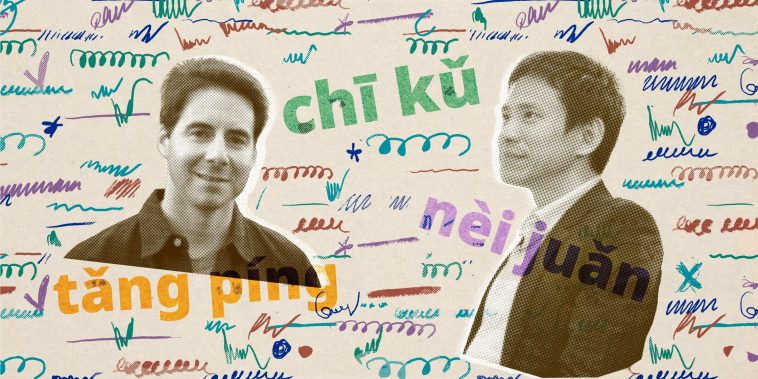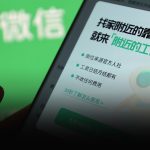Is your life better than that of your parents’ generation?
For all the frustrations young Chinese face in the workplace and at home, many would still answer in the affirmative, says Peter Hessler, the well-known author of “River Town” and “Oracle Bones.” Hessler, who has spent most of the past three decades chronicling the changing lives of Chinese across the world, still sees the younger generation as fundamentally optimistic about the future.
But for Xiang Biao, a popular anthropologist and the director of the Max Planck Institute for Social Anthropology in Germany, whose analyses of societal phenomena like “involution” and “lying flat” have been read by millions, the answer is less revealing than the thought process: He sees young Chinese as increasingly self-reflecting and willing to interrogate what words like “better” mean in the context of their lives.
This month, Hessler and Xiang sat down with Sixth Tone for a roundtable discussion on generational differences in China, the mental worlds of young Chinese, and the impact of new technologies on life and work. The following transcript has been edited for length and clarity.
Sixth Tone: Do you have any recent observations on the rising generation of young Chinese you’d like to share?
Peter Hessler: A lot of my observations are from teaching. I taught at Sichuan University from 2019 to 2021, and I’m still in touch with many of my former students. One thing that we often ask young people in America is, “Do you believe that your life is going to be better than your parents’?” And I think actually the majority of Americans now believe that young people’s lives are not going to be better than the lives of their parents. I think in the past they were always very optimistic.
I asked my former Chinese students the same question this year, the ones who are now in their 20s. A lot of people I talked to mentioned things like “996” (work schedules from 9 a.m. to 9 p.m., six days a week), or “lying flat” (rejecting societal pressure to work), and they often seemed less optimistic than the previous generation of Chinese young people. But when I asked them this question, I was actually surprised that most of them still believed that their lives are going to be better than those of their parents. A large majority answered that question positively.
The way they define better is also different, which I found interesting. One of them wrote: “As long as my mental and physical health is better than my parents’, my life is sure to be better than them in all ways. Living a healthy life is an essential part of enjoying happiness. The Chinese of the last generation treated themselves so severely, and I hope that we can do better in the future.” So, the definition of what it means for life to be better seems to be something they’re thinking about a lot, and their answers don’t always come down to material things.
Another student quoted from a letter he had just written to his mother: “I find things in this world dull, especially the things that normal people need to do. I have no desire to live my life following the same predictable patterns. So, when I make a decision, I try to choose the most playful and unexpected option.” I think this generation of young people faces major challenges, but I think they — or at least the ones that I’m in contact with — are open to the idea of redefining what it means to be happy or successful in society.
Xiang Biao: Peter mentioned the question of whether the younger generation believes they’ll live better lives than their parents. I think when sociologists or demographers ask this question, their measurements are probably based on very objective criteria: “Do you have a higher income?” “Is your health better?” But the thing I find interesting about the current generation of young Chinese is that they’re very reflective on this issue. They will add a reflexive twist to this question: to answer if I’m living well or not, I first need to define what that means.
I used to be a young Chinese myself, and I try to keep that in mind. It somehow makes me feel closer to them and helps me identify with them, rather than think of myself as an outside observer. The most important thing for me is to find out about what kind of problems young Chinese people are facing now, how they define these problems, and how they understand them. Maybe the overall situation is getting better. For instance, incomes are rising, while people now are starting to think about more meaningful problems. Their mental worlds are changing, and that change is re-arranging their material lives and power dynamics.
Sixth Tone: Every generation has its own patterns for confronting the uncertainty of life. What changes in these patterns have you noticed?
Hessler: I did surveys of my previous students, both from Fuling Teachers College and Sichuan University. (Editor’s note: Hessler taught in Southwest China from 1996 to 1998, and again from 2019 to 2021.) For my Fuling students, we’ve been corresponding since they graduated, so that’s 20 years now. One question I asked was: “What’s the quality that you most admire about your child?” My Fuling students were mainly born in the 1970s, grew up in rural China, and might be the first generation of their families to go to college. Here are some examples of their responses.
“He has no quality that makes me proud,” one wrote, which is something that an American parent would probably never say. But others wrote: “She shows great interest and talent in studying”; “He likes to ‘eat bitterness’ (chi ku, or bear hardship) and to study even though it’s tiring”; “She is well behaved and loves and cares for me a lot. She is not spoiled”; and “She is much more capable than my wife and me; she is good at learning new things.” So, lots of things that they saw as positive were things like the ability to persevere and eat bitterness.
I also asked them about the qualities of their children that bother or worry them the most. The answers were longer, which I think is the characteristic of their generation. They’re very sincere and answer very directly. One of them wrote, “He is kind of lazy and doesn’t like any kind of sports. I think he is weak.” Another one wrote, “She is not into sports in the slightest, and she is overweight.” I was struck that many of them talked about these physical qualities. I didn’t expect that but then I realized that these were young people who grew up in the countryside, and they were always outdoors when they were young as they worked on farms. They were accustomed to this and still had some of that mindset. But their children are now urbanites, and the parents don’t understand why their kids are not physically active and not in shape.
“He is too naive and does not know how to get along with others,” wrote one. “He does not drink at all. He has a small circle of friends.” For their generation, drinking helps cement social networks, so it’s very important to them.
Another one wrote: “He is likely to trust all the people around him. He thinks the world is great. He is likely to be cheated.” For that generation, the world was a hard place where you had to work hard and be competitive. It was intense. When they look at their children, they’re concerned that they’re too soft for the hard world that they’re used to.
Whereas, when I talked to my students from Sichuan University, who were mainly born in the 2000s, their view of the world was different. They don’t want to be part of this very hard, competitive, and intense world; they want to be part of something different. The way these two generations see their environment and their relationship to it is quite different. The older generation said this is the way the world is, and you have to adjust and deal with it. The young people are like: Maybe I can find a different place, maybe I can find a part of the world that doesn’t have this environment, and I don’t have to become like my parents, as they work so hard.
So, I think this is a striking difference. The older generation expects young people to be able to fit into this world, while young people feel like, “Maybe we can find something different.” They feel like they may have more options.
Xiang: Many of my classmates in high school who were born in the 1970s got quite decent jobs without going to university. When we graduated from high school in the early 1990s, there was a huge and swift economic expansion guided by the government. For example, the banks were expanding rapidly and opening many branches, so there were plenty of jobs. People didn’t need to have a university diploma to work there; vocational school or even high school diplomas were enough. It was quite easy.
Later, because of the expansion of university enrollment, competition intensified, which caused the so-called devaluation of diplomas, and the problem of “involution” emerged. So, the situation is different for the generation born in the 1990s. For Chinese born in the 1970s and 1980s, opportunities were abundant. Life was linear: good academic performance brought people a vocational school or university diploma, which came with life-long benefits. So, those generations believe in the power of hard work.
As for life patterns, they help people to predict the development of society. The older generations hold a solid opinion on life, believing that every effort will be rewarded, while ignoring the context of the economic boom they grew up in. As Peter mentioned, the older generations also perceive the world as a given. For instance, if the world is perilous, you have no other choice but to endure it and overcome it, then you will be rewarded.
But for the younger generation, the situation is different, especially in recent years. So, their feeling is very different from that of the previous generations. First, they don’t want to be in this world, and they don’t think they can change it either. They might feel much more pain, as they’re turning their energies inwards, toward themselves. They see many of their achievements as meaningless, and they feel sandwiched between parents’ aspirations and their own self-consciousness.
So, the contradiction they are facing is actually more severe than that faced by people who were born in the 1970s. It might seem that the young generation is quite weak, but they are actually tackling deeper questions. They are facing a more authentic question of life: Not about how to obey or endure, but how to rethink completely an environment that they’re unwilling to accept, and how to live better lives. For young Chinese, a more philosophical approach to life is necessary, which is something that our society also needs.
Intergenerational change is the process of history. It is irresponsible for older generations to criticize young people. The former should offer help and reflect on themselves through the eyes of the young generation. It’s quite narrow-minded to overvalue chi ku, and older people neglect many other important factors in their achievements. I call it a type of tunnel vision. Young people today are rejecting this viewpoint, but there’s a cost to that rejection, one we should try to lower.
Hessler: It was quite simple for the older generation. The goals were clear. For instance, to become educated or a city person, and to have a better material life. All of those things were possible; the environment allowed people to make that happen. But with the young generation, the goals are not that simple. It is much more open, and that creates pressure. For the 1970s generation, they knew exactly what they needed to do, and now that clarity is gone. Young people have to decide for themselves about what they care about and what their values are.
Sixth Tone: What do you think of the development of technologies like artificial intelligence and their influence on the younger generation?
Hessler: I’m personally not that interested in technology. My two daughters are in high school now and they don’t have cellphones. We want them to read real books.
When I hear from the young people I taught, they often talk about how there’s so little human contact now. One of them, who works in an office, said that he really noticed the lack of contact between people after graduating. People who work in the same office almost never talk to each other. They spend time on their phones or on the internet and don’t talk to the person next to them. “I often wonder if adults have any interest in having friends other than their family,” he said. That sort of isolation is something that I find concerning.
As for what we can do about it, I think it’s probably hopeless in some ways because it’s so overwhelming. As the parent of two young children, my wife and I have tried to introduce them to technology a little more slowly, and in a somewhat controlled way. We don’t just throw it all at them.
I also think it’s better if young people can develop some habits absent technology before they have access to technology. We always give our children books. They read their books and write a lot by hand. My goal was to have them develop habits like reading and focusing and thinking about one thing at a time. I think this is very difficult now. Many teachers in America talk about how young people can’t read a long book, as they can’t focus on something for that long. Whereas I believe that if they wait, if they are trained to do this earlier, then they can “survive” the cellphone better. But of course, at a societal level, I think this is basically impossible.
I think the cost of having all of this technology thrown at young people is very high, both in terms of their attention span, and in terms of their ability to communicate face to face. Those kinds of interactions remain meaningful, but I think people are becoming less skilled at them.
Sixth Tone: It seems there’s been a real decline in the value attached to the humanities in recent years. As anthropologists, what’s your attitude toward this issue?
Xiang: I do think that the humanities have to face a very real problem: How meaningful is our work to the public?
The real spirit and advancement of the humanities is found off-campus, outside academia. Chinese young people, for example, are interested in all kinds of ideological issues. They read, even on smartphones — sometimes they read very difficult and long articles on their phones.
When I was a student majoring in anthropology, people barely knew what anthropology was. But young people today pretty much all know the field, and not from school. They learn it from deliberate, amateur reading. This demand for humanities implies an optimistic future for the subject. Institutional discipline construction in universities is actually not the same as the development of the humanities itself.
In the United States, for example, all the political changes — the changes in people’s emotional and psychological states — these are all issues for the humanities. The problem with institutionalized academic production is that it doesn’t really meet the needs of the public that well. It is of course wrong to just close departments. But the present circumstances might force scholars to become more integrated with the public. In order to resist, scholars must establish their own mass base.
I think the development of technology is also a humanities issue. The discussion surrounding AI is characterized by growing malaise. There is a hypothesis that AI will completely change society and people. I think this attitude is very interesting — people were originally optimistic about technological progress, but now they think technology will ruin the world.
What is AI? What is big data? These are very real objects. They draw on all the texts that human beings have produced and recombine them to answer your questions. Their replies are not constructed out of thin air. They are a collection of human thoughts. Before, we could not call up a database of all human thought and get a result, but now we can. As an anthropology and sociology researcher, I believe AI is a kind of collective consciousness, but the problem is that your life is still yours, you’re still you, and you are different from the collective.
In terms of what Peter said before about reading, a survey found that about 20% of American adults are functionally illiterate. They can read, but they cannot process the information they read. I’d guess this is relevant to the political changes we’ve seen in recent years. As a writer, how do you feel about the phenomenon?
Hessler: Sometimes I feel like there are fewer readers, but the issue may be more that there are fewer writers. I think there are still people who read, but the ability to write decreases faster, because it’s harder to write than it is to read, and people will continue to read and have an interest in stories. It’s a very basic human need. But the ability to write to me is harder to develop in this environment. There are still going to be readers, but I think the capability for writing is declining, no question, so it’s going to be more of a special skill for the next generation.
Editors: Wang Juyi and Kilian O’Donnell.
(Header image: Visuals from interviewees and VCG, reedited by Ding Yining/Sixth Tone)





GIPHY App Key not set. Please check settings